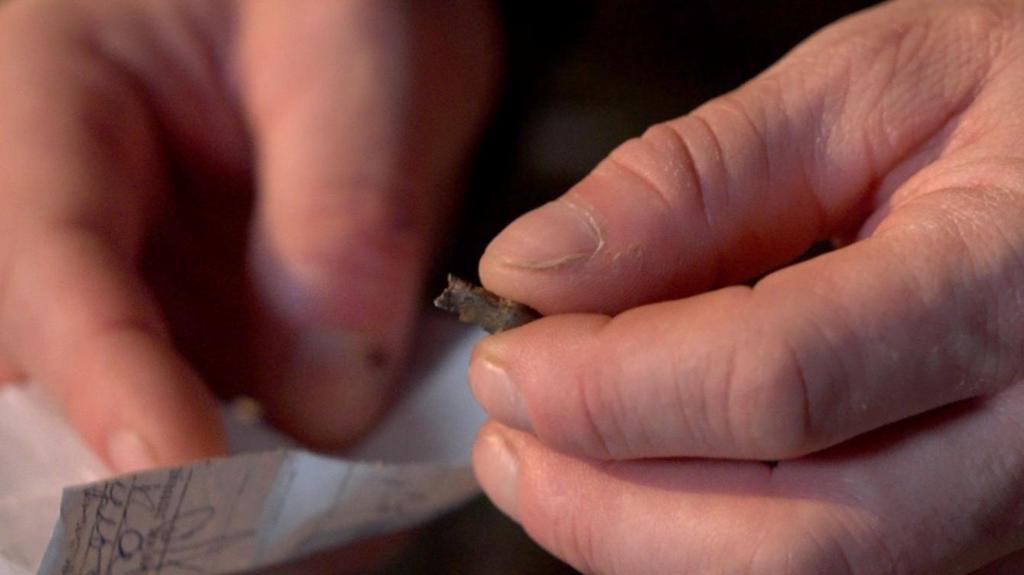From his pocket, Serhiy Melnyk retrieves a small, rust-tinged shard, carefully wrapped in paper.
Holding it aloft, the Ukrainian serviceman quietly recounts, “It grazed my kidney, pierced my lung, and my heart.”
Traces of dried blood remain visible on the shrapnel, a fragment from a Russian drone that became lodged in his heart during combat in eastern Ukraine.
“I didn’t even realize what it was at first – I thought I was just short of breath under my body armor,” he recalls. “They had to extract shrapnel out of my heart.”
With the increasing prevalence of drone warfare in Ukraine, such injuries are becoming more commonplace. Drones often carry weapons and materials that fragment, resulting in more complex shrapnel wounds.
According to Ukrainian military medics, shrapnel wounds now account for as much as 80% of battlefield trauma.
Without intervention, Serhiy’s injury would have proven fatal.
“The fragment was as sharp as a blade. Doctors said it was a large piece, and that I was lucky to survive,” he reflects.
However, his survival was not solely attributable to luck, but also to an innovative piece of medical technology: a magnetic extractor.
Cardiovascular surgeon Serhiy Maksymenko shares footage of the metal fragment embedded in Serhiy’s beating heart, prior to its delicate removal using a thin, magnet-tipped device.
“You don’t have to make large cuts in the heart,” Dr. Maksymenko explains. “I just make a small incision, insert the magnet, and it pulls the shrapnel out.”
In just one year, Dr. Maksymenko’s team has successfully performed over 70 heart operations using the device, which has revolutionized front-line medicine in Ukraine.
The development of these extractors followed the identification of an urgent need for a safe, rapid, and minimally invasive method of shrapnel removal by front-line medics.
Oleh Bykov – formerly a lawyer – spearheaded this development, having supported the army as a volunteer since 2014. Encounters with medics on the front lines led to the creation of the magnetic extractors.
The concept is not entirely new; magnets were employed for metal removal from wounds as early as the Crimean War in the 1850s. However, Oleh’s team modernized the approach, creating flexible models for abdominal surgery, micro-extractors for delicate procedures, and high-strength tools for bone applications.
Operations have become more precise and less invasive. The magnet can be run along the surface of a wound to draw out fragments, after which surgeons make a small incision for removal.
Holding a slim, pen-shaped tool, Oleh demonstrates its power by lifting a sledgehammer with the magnetic tip.
His work has garnered commendation from other war medics, including David Nott, a veteran of war zones worldwide.
“In war, things get developed which would never have been thought of in civilian life,” he observes.
Given the increase in fragmentation wounds due to the evolving nature of warfare, and the lengthy process of locating such fragments, he believes this device could be transformative.
He likens searching for shrapnel in patients to “looking for a needle in a haystack,” noting that it is not always successful and delays treatment for other casualties.
Manually searching for fragments can be hazardous and requires larger incisions, potentially causing more bleeding – “so to be able just to simply find them using a magnet is ingenious.”
What began as a field tool has now been implemented across Ukraine, with 3,000 units distributed to hospitals and front-line medics like Andriy Alban, who has come to rely on the device.
He often works under fire, in trenches or makeshift outdoor clinics, and sometimes without local anesthetic.
“My job is to save lives – bandage wounds and get soldiers evacuated,” he states.
The magnetic extractor has not yet received official certification.
The Ukrainian Health Ministry stipulates that medical devices must fully comply with technical regulations. However, in exceptional circumstances such as martial law or a state of emergency, the use of uncertified devices is permitted to meet the needs of the military and security forces.
At the height of war, there is no time for bureaucratic obstacles, explains Oleh. “These devices save lives. If someone thinks my actions are a crime, I’ll take responsibility. I’m even prepared to go to jail if it comes to that. But then all the doctors who use these devices should be incarcerated too,” he adds, half-jokingly.
David Nott concurs that certification is not a primary concern at present and believes the device could be beneficial in other conflict zones, such as Gaza.
“In war, it’s not really necessary. You only do the things which are important to save lives.”
Back in Lviv, Serhiy’s wife, Yulia, is simply grateful that her husband survived his injury.
“I just want to praise those people who invented this extractor,” she says tearfully. “Thanks to them, my husband is alive.”
Additional reporting by Jasmin Dyer and Kevin McGregor.
The rift exposes wider geopolitical shifts in the region, as Azerbaijan challenges Moscow’s dominant role.
The fundraising efforts are focused on bringing three lions stuck in Ukraine to the Doncaster park.
Malmesbury hosts its Ivana Kupala celebration for the third year in the grounds of the Abbey.
Russian shattered Mariupol with a months-long siege in 2022. Now, it says it’s rebuilding it.
MP Rachel Taylor will drive 1,300 miles from her constituency to the Poland-Ukraine border.

